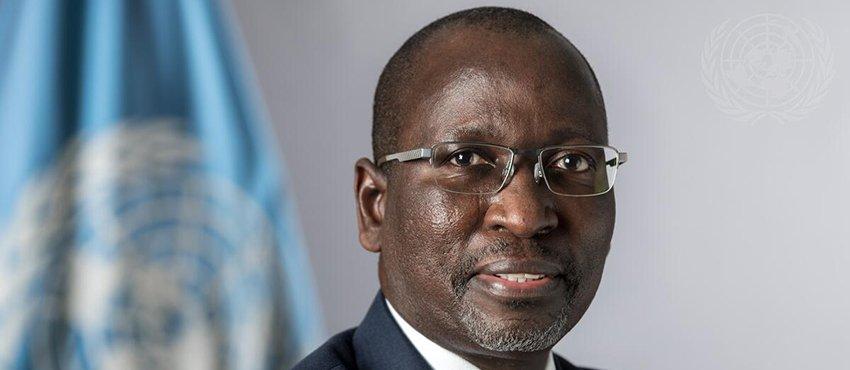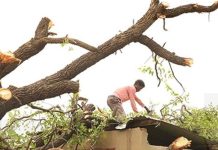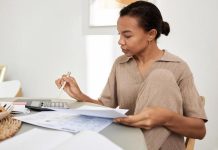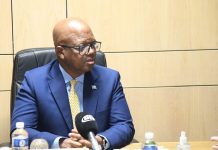Africa-Press – Botswana. Botswana’s Permanent Representatives to the United Nations and President of the United Nations Economic and Social Council (ECOSOC), Collen Kelapile, is in Gaborone this week to address the Second Global Webinar for 2022 Voluntary National Reviews countries. This is his address:
It gives me great honour to be home in-person to participate at this very important Second Global Webinar for countries presenting Voluntary National Reviews (VNRs) in 2022, not only as the President of the UN Economic and Social Council (ECOSOC) but also as a national of the host country of the Republic of Botswana.
At the outset, I take this opportunity to thank very much our Honourable Minister, Dr Lemogang Kwape, for honouring us with his presence this morning despite his very busy schedule.
I join him in extending a very warm welcome to all of you especially those who were able to travel to Gaborone to participate in-person in this Global Webinar. I also acknowledge all colleagues and distinguished delegates joining us virtually.
It is indeed a great pleasure and honour for Botswana to host this event, as we prepare for the United Nations High-Level Political Forum on Sustainable Development (HLPF) which I will convene under the auspices of ECOSOC in New York later in July this year.
I wish to extend our profound gratitude to the United Nations Department of Economic and Social Affairs (UN-DESA) for taking the usual lead in organising this Webinar.
My sincere appreciation goes to the European Union and the Government of Italy for providing generous support for the convening of this Global Webinar in Botswana.
A special thank you further goes to the Resident Coordinator and his Office, UN-Botswana team, as well as my colleagues at the Ministry of International Affairs and Cooperation and others in Government for supporting the organization of this event.
Furthermore, I thank the UN Regional Commissions for their continuous support, and for mobilizing VNR countries to participate in this Webinar.
Last month, I was in Kigali were I participated at the Africa Regional Forum on Sustainable Development (ARFSD-8) jointly organized by the UN Economic Commission for Africa (UNECA). Amongst other outcomes, the importance of the VNRs process was underscored and reaffirmed.
We are meeting here today against the backdrop of difficult and complex geopolitical developments, emanating from the war in Ukraine. Beyond the threat it poses to international peace and security, this war carries far reaching global consequences as evidenced by the associated humanitarian disaster and the destabilisation of the global economy as seen from the disruptions to the supply chains for essential commodities and the inflationary pressures especially on the economies of developing countries.
This indiscriminate impact does not only underscore the interconnectedness and interdependence of the global economy, but it also confirms the nexus between peace and development. There cannot be sustainable development without durable peace and security.
This comes also as we are still grappling with the COVID-19 pandemic, which has inflicted unprecedented human suffering and led to negative combined social, economic and health consequences.
The COVID-19 pandemic has impacted our world more than any other major crisis in recent history. But at, the same time, we must remain optimistic and work harder to see a continuing recovery from COVID-19 and hope that what is awaiting us ahead is better than what we left behind.
However, for an inclusive recovery to happen we urgently need to have vaccine equity for all countries and peoples of the world, especially in developing countries. We also need sound policies and equal access to financial resources to advance the implementation of the 2030 Agenda for Sustainable Development, as we approach the midpoint review of the SDGs – and as we prepare for the Second SDG Summit in September 2023.
Therefore, the 2022 High-Level Political Forum (HLPF) that I will convene as President of ECOSOC this year in July is crucial to give political impetus and guidance on how to recover better and sustainably from the pandemic and strengthen multilateralism, international cooperation and global solidarity.
Most importantly, the HLPF will take stock of the impacts of COVID-19 on the implementation of the 2030 Agenda, and the achievement of the SDGs. It will also adopt a Ministerial Declaration that is expected to provide political leadership, guidance and make recommendations on how to advance the full implementation of the 2030 Agenda during the Decade of Action and Delivery, as part of ensuring a sustainable, inclusive and resilient recovery from the pandemic.
The Forum will analyse whether policies and initiatives implemented thus far at national and international levels in the context of the recovery from the pandemic are transformative enough to reverse the negative trends in the implementation of the SDGs.
It will also reflect on the possible impacts of the current economic, financial and monetary policies of the developed countries on developing countries’ debt and financial space.
As you would all be aware, this year we will conduct in-depth review of five (5) SDGs: SDG 4, on quality education; SDG 5, on gender equality; SDG 14, on life below water; SDG 15, on life on land; and SDG 17, on partnerships for the Goals.
The Forum will take into account the different and particular impacts of the COVID-19 pandemic across all the SDGs, and the integrated, indivisible and interlinked nature of the Goals.
We will address the importance of equitable access to the vaccines and therapeutics, and how to support the response and recovery in the special context of African countries, as well as other countries and regions while reviewing the impact of the pandemic on their SDG progress.
Subnational and local reviews will also be a part of the discussions. The HLPF can learn from those reviews and reflect on their link with the VNRs; while also making preparations for the 2023 SDG Summit.
I am aware that all of us have been working very intensively in preparing our VNRs, starting with the first Webinar held in October last year. I want to assure you that our evidence-based findings and conclusions on the implementation of the 2030 Agenda will be an important input to the HLPF.
The HLPF will draw from the VNRs to determine what kind of strategies and measures are we undertaking to recover from the COVID-19 pandemic through advancing the 2030 Agenda.
In the seventh year of reporting to the HLPF – despite the crisis – we do see that much progress has been made in the implementation of the SDGs in terms of the development of institutions, partnerships, strategies and cooperation mechanisms.
This will help to reverse the negative impact of the pandemic on the SDGs, and assist on-going efforts to build back better from the pandemic.
As President of ECOSOC, I have pledged that the Council and the HLPF will be inclusive, listening particularly to the voices of the poorest and most vulnerable, involving women and girls, indigenous peoples, youth, persons with disabilities and other key stakeholders at the global level.
To that end, significant work is being carried out through civil society organisations and youth forums, as well as multi-stakeholder platforms and partnerships for SDGs achievement.
The outcomes of the ECOSOC Youth Forum to be held next week, on the 19th and 20th of April, will also feed into the HLPF, to allow youth from around the world to contribute to the dialogue and engage with Member States on their concerns and priorities in the work of the United Nations.
I, therefore, hope that I will be able to welcome your selected Heads of State and Government as Keynote Speakers as well as Ministers and other representatives in sufficient numbers in New York, in July.
As the HLPF will be held in person, I am happy to say that we will be able to allocate sufficient time to countries to present their VNRs and interact with other participants in order to enhance experiences-sharing and peer-learning.
I know that my two colleagues, the Permanent Representatives of Morocco and the Philippines, will shortly be talking about the Group of Friends of VNRs that they are co-chairing.
I would just like to encourage you to avail yourself of this opportunity to get a “friend” – another country – to help you with preparation and presentation of your VNRs at the HLPF.
As in previous years, I am happy to note that UN-DESA is also planning to organize VNRs Labs, and you can let the Secretariat know if your country wishes to participate in one of these Labs in order to share more information.
For More News And Analysis About Botswana Follow Africa-Press






